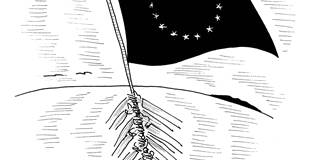The EU’s Forgotten Foundations
Twenty years ago this month, in Copenhagen, the European Council established the eligibility requirements for joining the EU. But, with the EU navigating the severest economic crisis since its creation, one might wonder whether this anniversary is an occasion for lamentation rather than celebration.
COPENHAGEN – Twenty years ago this month, in Copenhagen, the European Council established the eligibility requirements for joining the European Union. But, with the EU navigating the severest economic crisis since its creation, one might wonder whether this anniversary is an occasion for lamentation rather than celebration.
In fact, it is the EU’s economic struggles that make it particularly important this month to reaffirm the so-called Copenhagen Criteria – which facilitated significant EU enlargement – as a highly consequential codification of countries’ transition to market-based liberal democracy. Adopted just over a year after the Soviet Union’s dissolution, the criteria served as a bold symbol of Europe’s escape from superpower politics and freedom to define its own future.
The ambition of the former Soviet-bloc countries of Central and Eastern Europe to join the EU, which they considered essential to their economic and political transformation, is a testament to the EU’s most extraordinary power – that of attraction. The unwavering support of the United States, together with the expansion of NATO, facilitated the EU’s pursuit of one of the most profound ideas driving the development of civilization – that free trade and mobility among societies is the best route to peace and stability.



COPENHAGEN – Twenty years ago this month, in Copenhagen, the European Council established the eligibility requirements for joining the European Union. But, with the EU navigating the severest economic crisis since its creation, one might wonder whether this anniversary is an occasion for lamentation rather than celebration.
In fact, it is the EU’s economic struggles that make it particularly important this month to reaffirm the so-called Copenhagen Criteria – which facilitated significant EU enlargement – as a highly consequential codification of countries’ transition to market-based liberal democracy. Adopted just over a year after the Soviet Union’s dissolution, the criteria served as a bold symbol of Europe’s escape from superpower politics and freedom to define its own future.
The ambition of the former Soviet-bloc countries of Central and Eastern Europe to join the EU, which they considered essential to their economic and political transformation, is a testament to the EU’s most extraordinary power – that of attraction. The unwavering support of the United States, together with the expansion of NATO, facilitated the EU’s pursuit of one of the most profound ideas driving the development of civilization – that free trade and mobility among societies is the best route to peace and stability.